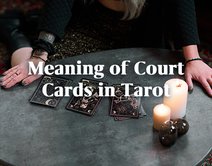TL;DR
How do we learn the meaning of the court cards in Tarot? Do the court cards represent people or situations? How do their personality traits relate to Astrology and the Four Elements? Learning about the court cards and what they mean can help us improve our Tarot skills and gain valuable insight from our readings. Find out all with Mysticsense.In this article, you will learn about the meaning of the court cards in Tarot, how they relate to each elemental group and what their personality traits are. Court cards in Tarot may be difficult to understand for novice readers, but without them, it is incredibly difficult to pick up on different themes and nuances, especially regarding individuals in our lives. Whether you want answers regarding your love life, family or friendship, understanding the role of court cards in Tarot gives profound insight into all of these areas and more.
An Overview of Court Cards

Part of the Minor Arcana cards, court cards are represented by Pages, Knights, Queens and Kings, following on from number Ten and in that order. Although, in some Tarot decks, the Pages and Knights are represented by Princes and Princesses respectively. There are four ‘royal families’ in a Tarot deck - one family per suit so, as such, there are 16 court cards in the whole deck. Court cards represent people in the questioner’s life, including the questioner themselves, but confusingly they can represent situations on occasion. Trying to decipher when court cards are pointing to a person or a situation can be quite a challenge so you need to look at the position of the card amongst others to gauge insight. Let your intuition guide you and always place priority on the context of the reading.
Unsurprisingly, court cards are notoriously difficult to interpret for novice Tarot readers and are arguably the most difficult cards to interpret in the whole deck. However, after practice and experience, court cards can become the cards that illuminate the most information about people or situations. They can astutely reveal people’s hidden characteristics and motivations, providing a more nuanced angle to many different scenarios being read for. For this reason, if you can grasp a solid understanding of the complex court cards, you are likely to get the most satisfaction and positive feedback from your readings.
Court Cards Representing People

Typically, Pages represent children and teenagers, Knights represent young adults, Queens represent women and Kings represent men. However, this rule should not be followed meticulously. A woman can fit the personality of a King and vice versa. As masculinity and femininity is such a fluid scale, we cannot simply rely on exact gender matches when applying the court cards to people in our lives. We can, however, look at the masculine traits a woman may possess or the feminine qualities a man may have when trying to relate the cards to individuals. With that being said, the Page cards are the most ‘androynous’ court cards, simply representing young children and teenagers. With Pages, we don’t need to consider masculine and feminine traits at all.
Court Cards and Physical Characteristics

Other aspects which you may need to look out for when studying older tarot guides is that the court cards have previously been associated with physical traits. For example, Cups are traditionally associated with blonde or red hair and fair skin. This obviously needs to be disregarded altogether as it is an unnecessary layer of complication and does not allow for racial diversity. In sum, ignore all references to physical characteristics when reading older texts about Tarot court cards.
Court Cards and the Four Elements
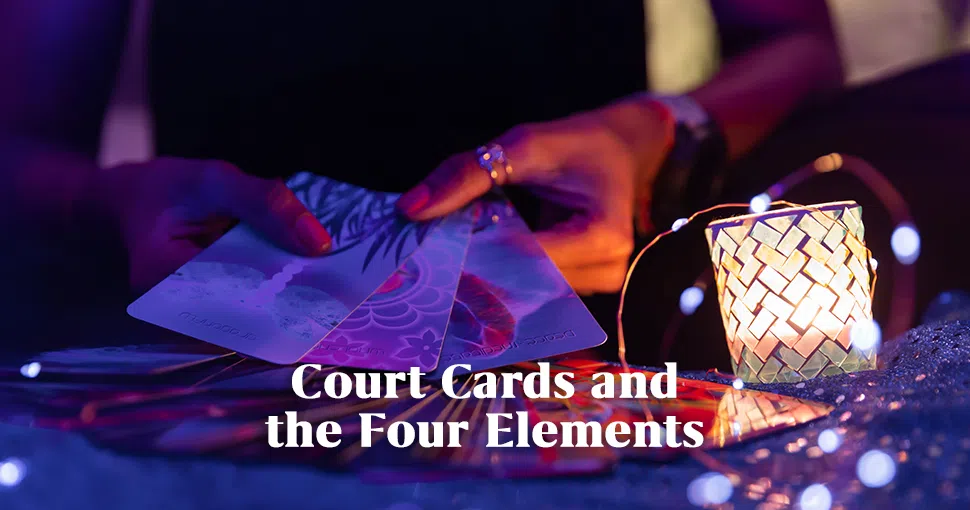
When learning about the court cards, It helps to take a two layered approach as it makes it easier to start interpreting the various card ‘personalities’. The first layer to note is that each court card is dominated by the Tarot card suit meanings. For instance, Wands represent the element of fire and the realm of action, dynamism and inspiration.The second layer to add is that each royal rank itself is assigned an element. Kings are Fire, Queens are Water, Knights are Air and Pages are Earth. This starts to add greater depth and dimension to the card. We can then assign general personalities to the element. For example, Fire is temperamental, active, inspiring, enthusiastic, but at its worst, argumentative and hot-headed. With this secondary ‘elemental’ layer, you can start to see how these traits would look in a real person.
As such, we are left with two different elemental layers to take into account. A King (Fire) of Wands (also Fire) would therefore be an incredibly ambitious, impulsive and fiery character. On the other hand, a Queen (Water) of Pentacles (Earth) would be a combination of Watery and Earthy characteristics. It is up to the reader to try and decipher the personality being represented here.
Outlined below is a quick summary of the general personality characteristics assigned to each of the Four Elements;
- Fire - Temperamental, active, inspiring, enthusiastic. This personality can burn bright but can also experience burn-out, becoming exhausting company over time. They are passionate yet argumentative individuals.
- Water - Emotional, feeling, intuitive and expressive. This personality often changes so much that it is difficult to get a grasp on their motivations. They can sometimes become depressive individuals.
- Air - Intellectual, thinking, logical. Air personalities are fantastic communicators, excelling in the use of words to further their cause. They can also use their words to wound, though.
- Earth - Practical, matter-of-fact and down to earth. Earth personalities often combine some of the characteristics of the other three elements but in a more pragmatic way. However, sometimes Earth can come across as a bit dull. They are also either excellent or hopeless with money.
The Court Card Personalities

The court cards illustrate the whole range of human characteristics - both the good and the bad. It hardly goes without saying that just one card cannot fully represent an actual person. Humans are all so complex that to shoehorn an individual’s personality into the symbolism of a single Tarot card would be impossible. However, court cards are great at reflecting aspects of a personality, people’s attitude towards a certain situation or simply represent a mindset someone may possess.
Pages

The Pages (sometimes known as Princesses) are the youngest and most immature of the Tarot court cards. They often represent children, adolescents and those who are just on the cusp of adulthood. If not representing a person’s literal youth, they may also symbolize someone with an incredibly youthful outlook on life. Pages also represent personality types that are still in their development stages. This person may be coming to terms with their place in the world and their interactions with other people. They are learning, growing and still have time to adapt.
While Pages are introspective and practical, these characteristics are defined within the boundary of their suits of Tarot. For instance, the Page of Wands is incredibly ambitious, bordering on reckless, while the Page of Cups expresses themselves through their emotions far more. Even a mature person can be represented by a Page, especially if embarking on a new venture or life experience. Pages can also signify the overwhelming desire to escape the stresses and constraints of adulthood, showing a person regressing into childish tendencies.
A summary of the Pages of each suit are as follows;
- Page of Wands - Talkative, youthful, ambitious, reckless
- Page of Cups - Reflective, loving, immature, emotional
- Page of Pentacles - Hard-working, driven, educated, entitled
- Page of Swords - Opportunistic, characterful, fearless, spiteful
Knights
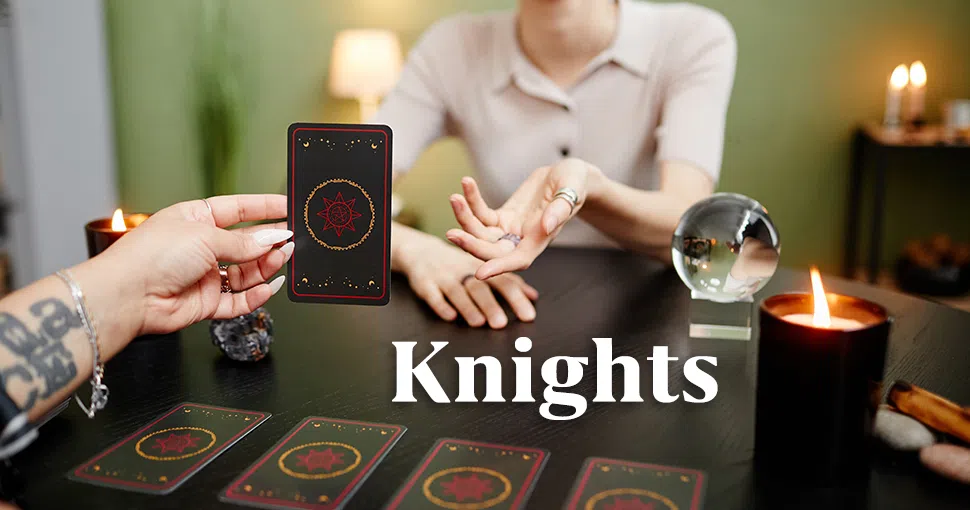
Knights are typically young people in their twenties or thirties who are actively moving towards maturity. These people are often still searching for answers and have not quite defined their life-path yet. Knights are bold and intense, if not a little reckless, as they have not yet learned to restrain their impulsive youthful tendencies. While Knights are confident on account of their youthfulness, they still don’t fully know who they are. They may have anxieties or insecurities about this uncertainty, although they are unlikely to show it.
Knights can sometimes be disappointing and let people down due to thoughtlessness and a certain amount of selfishness. If a Knight appears in an older person’s reading then it can either indicate that they still have a strong sense of youthfulness, or they perhaps even are youthful by appearance. In a negative context, a Knight can symbolize an older person with an immature mindset.
A summary of the Knights of each suit are as follows;
- Knight of Wands - Charming, romantic, daring, irresponsible
- Knight of Cups - Honorable, loving, exciting, deceptive
- Knight of Pentacles - Steady, reliable, truthful, unimaginative
- Knight of Swords - Hasty, analytical, unpredictable, argumentative
Queens
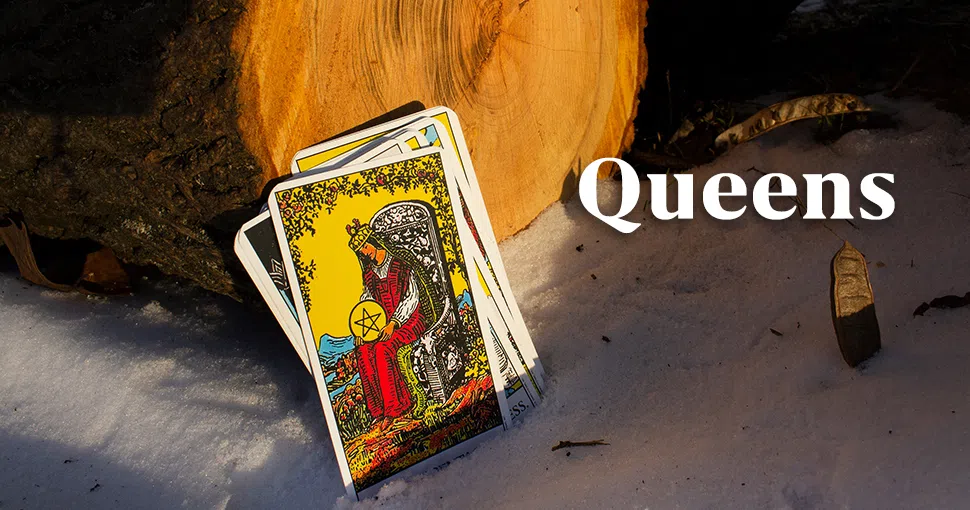
Queens possess a level of maturity and experience not reflected in the Knights and Pages. A Queen is quietly confident and is comfortable with who she is. Queens are also quite introspective and are also very interested in other people. Depending on the suit, they can be nurturing, seductive, conniving or practical.
One thing to note is that Queens are more passive than Kings, preferring to watch and learn before rushing into action prematurely. They are fantastic observers and as such, have an ability to understand people very astutely. Queens are also mistresses of game-playing, being quite capable of manipulation if they see it necessary. As friends, they can be either super reliable and loyal or slightly two faced. Similarly, as bosses, they can be supportive or, at their worst, spiteful depending on the situation at hand.
A summary of the Queens of each suit are as follows;
- Queen of Wands - Reliable, honest, open, jealous
- Queen of Cups - Nurturing, gentle, sensitive, selfish
- Queen of Pentacles - Sensible, determined, money-minded, materialistic
- Queen of Swords - Professional, cool, abrupt, vicious
Kings
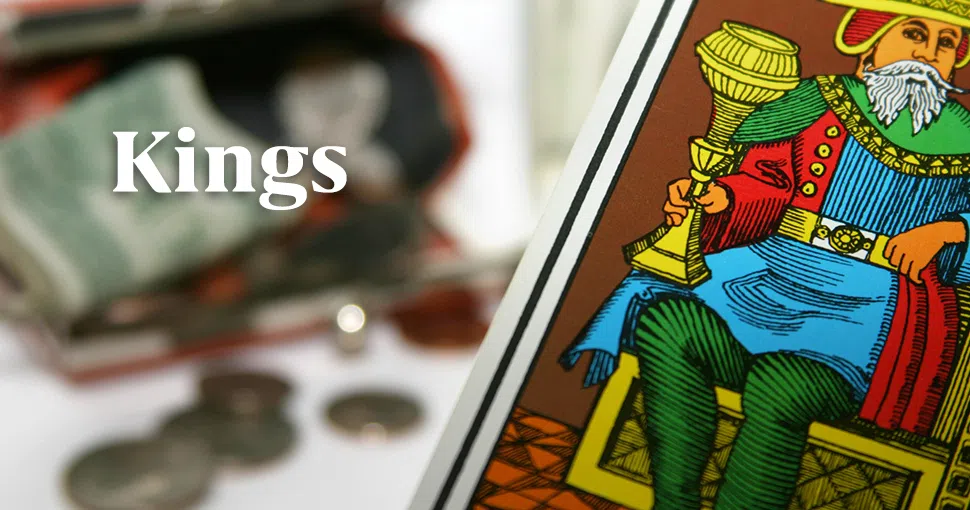
Kings are considered to be the rulers of their suit in line with the stereotypical image of a King being the ruler of all. However, this does not mean that they are dictators or abuse their power - rather, it means that this personality type is masculine, mature and active in the sense that the King prefers taking action instead of doing nothing. Kings look outwards and are more interested in events and logic than in people and feelings. They also often symbolize paternal figures, either in a familial sense or perhaps a kind-hearted boss at work.
Kings have, or at least should have, gained clarity and wisdom through life experience. In a young person’s reading, a King would indicate a mature and sensible outlook on life, similar to the expression of ‘an old head on young shoulders’.
A summary of the Kings of each suit are as follows;
- King of Wands - Helpful, authoritative, affectionate, narcissistic
- King of Cups - Compassionate, kind, disciplinary, possessive
- King of Pentacles - Negotiator, leader, frugal, dull
- King of Swords - Powerful, intelligent, unemotional, abrupt
Only when you begin looking more closely at Tarot do you appreciate the gravity of its significance. Each of the cards has a voice, its own unique vibration and message to tell. The role of the court cards in Tarot can be thought of as representing different personality types or mindsets. They usually symbolize actual people but can signify situations more broadly. As such, they are difficult cards to read but once mastered, they provide incredible nuance in a reading.
Do you still want to know more about what court cards mean in Tarot? Or perhaps you are interested in learning how to include court cards in your own personal readings. Either way, there are talented psychics at Mysticsense who are available 24/7 to help you with this and any other questions you may have. Get started learning more about the court cards with us today!

